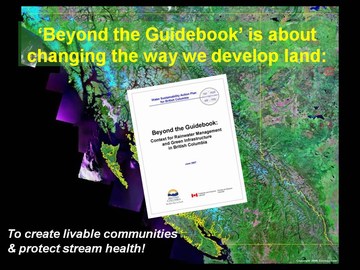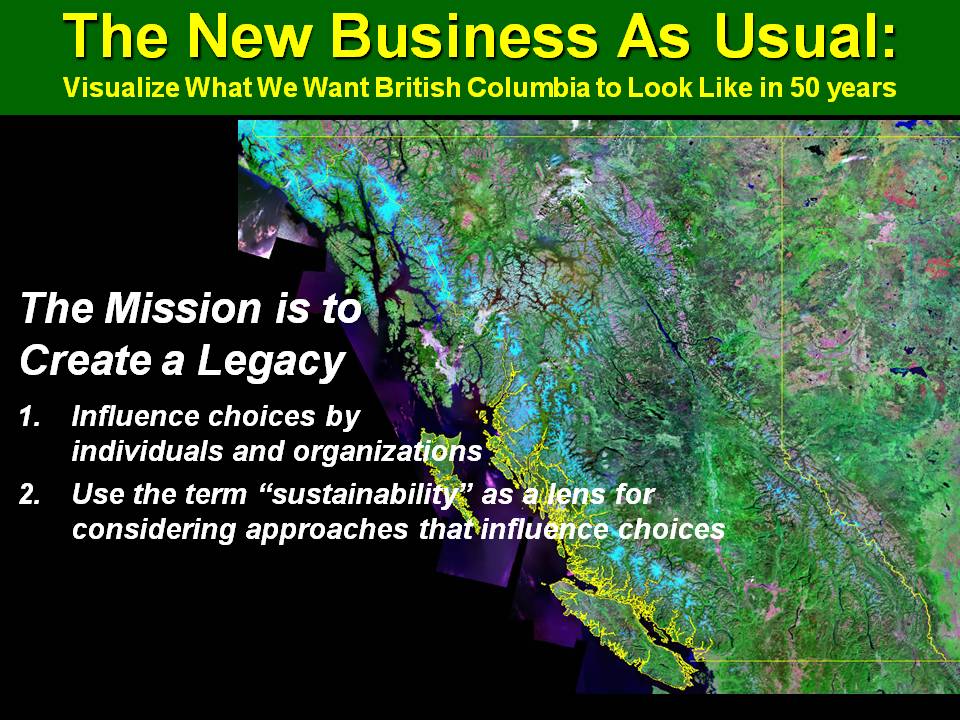PENTICTON FORUM STORY #2: Doing Business Differently – Convening for Action in the Georgia Basin
Building Bridges and Breaking Barriers at the Penticton Forum – Teamwork for a WaterSmart World
The Penticton Forum will be held at the Penticton Trade & Convention Centre as an adjunct to the 2009 Annual Conference of the BC Water & Waste Association (BCWWA) on April 29.
- The meet-and-greet is at 8:00am. The morning session commences at 8:30am; the afternoon session ends at 4:15pm. Lunch will be provided.
- For a preview of the Agenda, click on Lesson Plan – Draft Outline of What We Want to Achieve.
- To download a report-style, PDF version of the following web story about the Penticton Forum, click on Doing Business Differently – Convening for Action in the Georgia Basin
- This is the second in a series of weekly stories that progressively connect the dots and foreshadow what participants can expect on April 29.
- The Forum will be of educational value to elected representatives. It is especially relevant to municipal administrators, municipal engineers, and municipal planners; water resource and land use planners; and water conservation, green infrastructure and drainage practitioners. The Forum will also be of value to those in the conservation and stewardship sector.
For information on how to register, go to www.bcwwa.org or contact the BCWWA ofice at 604-433- 4389.
Convening for Action in BC
How do we align our efforts at three scales – provincial, regional and local – to do business differently, prepare communities for change, and choose to be water smart?
Think and Act Like a Region
The Province’s Living Water Smart and Green Communities initiatives provide a framework and direction for convening for action in the Okanagan, on Vancouver Island and in Metro Vancouver. Each regional initiative is developing a vision and road map for doing business differently in order to change the way that land is developed and water is used.
Three provincial Ministries (Environment, Community Development, and Agriculture & Lands), the Okanagan Basin Water Board, and the Water Sustainability Committee of the BC Water & Waste Association (BCWWA) are hosting a forum in Penticton on April 29 as an adjunct to the BCWWA Annual Conference.

1. Forum Program – An Overview
“The forum program is organized as four modules, and is built around two themes that are intertwined, namely: ‘creating our future’ and ‘doing business differently’. While each module is stand-alone, they are linked,” states Glen Brown. He is an Executive Director with the Ministry of Community Development; and is Chair of the Water Sustainability Committee.
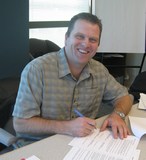 “First, we will define the challenge. Then we will tell the stories of what is already taking place on-the-ground in the Okanagan and Georgia basins. We will conclude by presenting a blueprint for action.”
“First, we will define the challenge. Then we will tell the stories of what is already taking place on-the-ground in the Okanagan and Georgia basins. We will conclude by presenting a blueprint for action.”
“Regional leaders will elaborate on new approaches and tools that are changing the way land is developed so that we can achieve water sustainability.”
The Story of the Penticton Forum
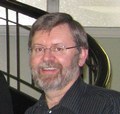 “This is the second in a series of stories leading up to the Forum, explains Kim Stephens, Program Coordinator for the Water Sustainability Action Plan for British Columbia. “Their purpose is to progressively connect the dots and foreshadow what participants can expect on April 29th.”
“This is the second in a series of stories leading up to the Forum, explains Kim Stephens, Program Coordinator for the Water Sustainability Action Plan for British Columbia. “Their purpose is to progressively connect the dots and foreshadow what participants can expect on April 29th.”
“This Story #2 describes how a regional team approach is being advanced on Vancouver Island and in Metro Vancouver to establish consistent expectations when making green choices.”
2. Doing Business Differently in the Georgia Basin
Released in 2004, the Water Sustainability Action Plan for British Columbia is sponsored by the Province and supports the Living Water Smart and Green Communities initiatives. Action Plan elements are being delivered by BCWWA through partnerships and regional pilot programs. Over the past three years, Action Plan efforts have been concentrated in the Georgia Basin – that is, on Vancouver Island and in Metro Vancouver.
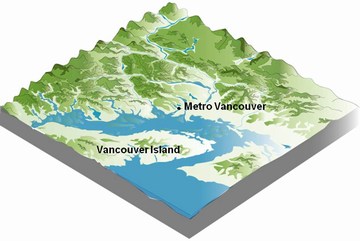
Tools and Education
“The Water Sustainability Action Plan comprises inter-connected program elements that give local governments and practitioners the tools and experience to better manage land and water resources,” explains Kim Stephens. “Examples of tools developed under the umbrella of the Action Plan include the Water Balance Model and the Water Bucket Website.”
“Through outreach and education, the guiding vision is to influence land and water practitioners to learn about and use practices that better balance the necessary relationships of settlement activity and ecological assets in local and regional landscapes. The pilot 2008 Vancouver Island Learning Lunch Series is an example of a precedent-setting approach to informing and educating local government and private sector practitioners.”
Convening for Action
In Module C, the trio of Robert Hicks, Michael Tanner and Derek Richmond will combine to tell the story of Convening for Action in the Georgia Basin and set the scene for a town hall sharing session: What is your green infrastructure story?
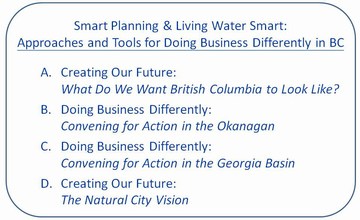
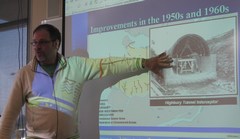 Robert Hicks, a Senior Engineer with Metro Vancouver, will start by explaining the genesis for the Water Balance Model in 2001. “In a nutshell, the region needed a tool that would enable regulators and designers to quantify and evaluate how we can reduce our hydrologic footprint. Furthermore, the tool needed to be interactive and able to quickly generate scenario comparisons.”
Robert Hicks, a Senior Engineer with Metro Vancouver, will start by explaining the genesis for the Water Balance Model in 2001. “In a nutshell, the region needed a tool that would enable regulators and designers to quantify and evaluate how we can reduce our hydrologic footprint. Furthermore, the tool needed to be interactive and able to quickly generate scenario comparisons.”
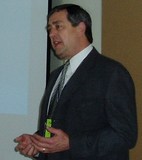 Then Mike Tanner, Chair of the Water Bucket Website Partnership, will briefly elaborate on the communications strategy that is keyed to news releases complete with embedded links to web stories. “This approach is proving very effective in raising awareness of the Water Balance Model and informing practitioners about the purpose and scope of the Learning Lunch Series.”
Then Mike Tanner, Chair of the Water Bucket Website Partnership, will briefly elaborate on the communications strategy that is keyed to news releases complete with embedded links to web stories. “This approach is proving very effective in raising awareness of the Water Balance Model and informing practitioners about the purpose and scope of the Learning Lunch Series.”
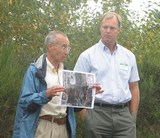 Derek Richmond, Manager of Engineering with the City of Courtenay, will conclude the presentation segment by describing how “the Learning Lunch Series has helped Vancouver Island local governments advance a regional team approach to rainwater management and green infrastructure.”
Derek Richmond, Manager of Engineering with the City of Courtenay, will conclude the presentation segment by describing how “the Learning Lunch Series has helped Vancouver Island local governments advance a regional team approach to rainwater management and green infrastructure.”
3. Genesis of Water Balance Model
“The genesis of the water balance methodology development was UniverCity, the sustainable community being built adjacent to Simon Fraser University atop Burnaby Mountain in Metro Vancouver,” states Kim Stephens.
“In the year 2000, translating high expectations for this ‘green’ development into practical design guidelines meant revisiting accepted drainage engineering practice; this need for innovation eventually led to development of the web-based Water Balance Model.”
The Early History
“In 2001 the Stormwater Interagency Liaison Group (SILG), a technical committee of the Greater Vancouver Regional District, recognized the value of the water balance approach and funded the development of a working model to assess the affordability and feasibility of site design solutions for achieving performance targets,” continues Robert Hicks.
“The results of this applied research were then incorporated as Chapters 6, 7 and 8 in Stormwater Planning: A Guidebook for British Columbia, released by the Province in June 2002. This guidance document, founded on BC case study experience, formalized a science-based understanding to set performance targets for reducing rainwater runoff volumes.”
“In July 2002 the Inter-Governmental Partnership was formed to develop the Water Balance Model as an extension of the Guidebook. The IGP began as a subgroup of SILG and quickly expanded to become a provincial group with municipal representation from four regions: Greater Vancouver, the Fraser Valley, Vancouver Island and the Okanagan Valley.”
Innovation & Success on the Ground
“British Columbia is recognized internationally as a leader in implementing a natural systems approach to rainwater management in the urban environment. In many ways, that recognition is an outcome of the trail-blazing efforts of SILG at the beginning of this decade,” states Ted van der Gulik, IGP Chair.
 “The efforts of SILG in championing research and innovation made it possible to develop the tools and promote the applications that helped overcome fear and doubt in Metro Vancouver, and begin doing business differently. This enabled landmark projects such as UniverCity and the East Clayton Sustainable Community to get off the ground.”
“The efforts of SILG in championing research and innovation made it possible to develop the tools and promote the applications that helped overcome fear and doubt in Metro Vancouver, and begin doing business differently. This enabled landmark projects such as UniverCity and the East Clayton Sustainable Community to get off the ground.”
4. Water Balance Model & Beyond the Guidebook
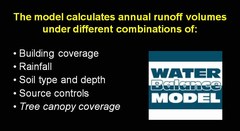 “The Vancouver Island Learning Lunch Series provided a timely opportunity to introduce Vancouver Island municipalities to the latest version of the web-based Water Balance Model,” states Kim Stephens.
“The Vancouver Island Learning Lunch Series provided a timely opportunity to introduce Vancouver Island municipalities to the latest version of the web-based Water Balance Model,” states Kim Stephens.
Performance Targets
“In 2003, we developed the first-generation Water Balance Model as an extension of the Stormwater Planning Guidebook to promote rainwater management and ‘green’ development practices at the site scale,” reports Ted van der Gulik.
 “As of 2008, the Water Balance Model web interface has been integrated with the QUALHYMO hydrologic engine which was developed for the Ontario Ministry of Environment in the 1980s. Because the ‘new’ Water Balance Model has considerably enhanced simulation capabilities, this now enables local governments to establish science-based watershed targets for rainwater runoff capture.”
“As of 2008, the Water Balance Model web interface has been integrated with the QUALHYMO hydrologic engine which was developed for the Ontario Ministry of Environment in the 1980s. Because the ‘new’ Water Balance Model has considerably enhanced simulation capabilities, this now enables local governments to establish science-based watershed targets for rainwater runoff capture.”
The New Business As Usual
“The new Water Balance Model underpins Beyond the Guidebook: The New Business As Usual,” adds Kim Stephens. “The integrated tool is unique, bridges engineering and planning, and links the site to the stream and watershed.”
“The Beyond the Guidebook methodology enables us to correlate green infrastructure effectiveness in protecting stream health.”
“We are using the slogan The New Business As Usual to convey the message that, for change to really occur, practices that until now have been viewed as the 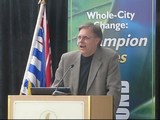 exception must become the norm moving forward. We have to build regulatory models and develop models of practice and expertise to support The New Business As Usual”, stated Dale Wall, Deputy Minister when he announced the change-over to the new Water Balance Model at the Gaining Ground Summit.
exception must become the norm moving forward. We have to build regulatory models and develop models of practice and expertise to support The New Business As Usual”, stated Dale Wall, Deputy Minister when he announced the change-over to the new Water Balance Model at the Gaining Ground Summit.
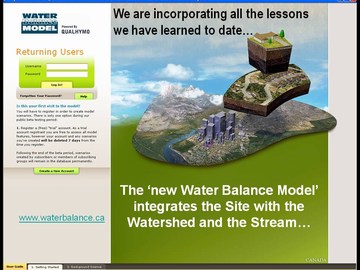
5. Premier’s Award for Innovation and Excellence
“The Premier’s Awards are an annual opportunity to publicly recognize the 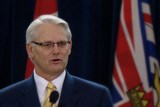 extraordinary accomplishments of the men and women who have chosen public service as their career,” said Premier Gordon Campbell on February 5, 2009 at an awards ceremony where the Water Balance Model received the Premier’s Award for Innovation and Excellence.
extraordinary accomplishments of the men and women who have chosen public service as their career,” said Premier Gordon Campbell on February 5, 2009 at an awards ceremony where the Water Balance Model received the Premier’s Award for Innovation and Excellence.
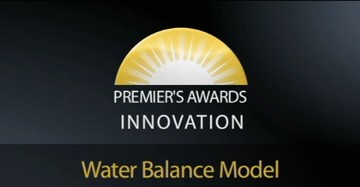
The Story of the Water Balance Model
The Premier’s Office has produced a 2-minute video that features Ted van der Gulik and Kim Stephens telling the story of what the tool means for British Columbia.
“The Water Balance Model is a means to an end,” states Ted van der Gulik. “The challenge that we have been posing since 2002 is this: What do we want this province to look like in 50 years and beyond?“
“The Water Balance Model is a tool that will help us create our future,” adds Kim Stephens. “To get to the big picture, it starts with the smallest pieces. The Water Balance Model links the site to the stream to the watershed.”
To Learn More:
To view the video and learn more about “the story of the Water Balance Model”, click on this link to Premier’s Award recognizes the Water Balance Model for its innovation and excellence.

One-on-One with the Premier
At the conclusion of the awards ceremony, the Premier sought out Ted van der Gulik. This created an opportunity for an extended conversation.
 “As we talked, it became clear to me that WATER is high on the Premier’s agenda. He has a strong grasp of water-related issues and the long-term implications if we do not start doing business differently in BC. In a nutshell, he gets it.”
“As we talked, it became clear to me that WATER is high on the Premier’s agenda. He has a strong grasp of water-related issues and the long-term implications if we do not start doing business differently in BC. In a nutshell, he gets it.”
“The Premier expressed his personal commitment to making a difference because we have an obligation and a responsibility to act on behalf of our children and our grand-children so that we leave them with a legacy.”
“On the matter of the Living Water Smart initiative, I came away from our conversation with a strong conviction that Premier Campbell means what he says, and says what he means about the province-wide importance of implementing BC’s Water Plan. High-level recognition of the Water Balance Model is reassuring… because the model is a key tool underpinning Living Water Smart,” concludes Ted van der Gulik.
 “During the current climate of financial uncertainty, it becomes that much more important to stay on mission vis-à-vis rainwater management and green infrastructure solutions that protect quality of life,” adds Kim Stephens. “In terms of the long-term vision for BC, and as the Premier emphasized in his speech from the heart, now is the time to be preparing for economic recovery that is truly based on making green choices.”
“During the current climate of financial uncertainty, it becomes that much more important to stay on mission vis-à-vis rainwater management and green infrastructure solutions that protect quality of life,” adds Kim Stephens. “In terms of the long-term vision for BC, and as the Premier emphasized in his speech from the heart, now is the time to be preparing for economic recovery that is truly based on making green choices.”
6. Water Bucket Website
“Launched in 2005, the waterbucket.ca website is the key to the communications strategy for the Water Sustainability Action Plan,” states MikeTanner, Chair of the Water Bucket Partnership. “The website is designed to provide the complete story on integrated land and water management – why, what, where and how.”

Water Bucket Vision
“The vision for the website has been to provide a resource rich, highly interactive ‘destination location’ for information and communication related to water sustainability in British Columbia. By providing universal access to information we believe we will see improved standards in all aspects of land development and water resource management.”
Communities-of-Interest
“The website comprises a family of ‘communities-of-interest’, or COIs, that provide a ready-made platform for advancing a ‘design with nature’ approach to community development. COIs that correspond to elements of the Water Sustainability Action Plan include:
- Convening for Action
- Water-Centric Planning
- Green Infrastructure
- Rainwater Management
These COIs provide local governments with a sustainability lens through which they can view their plans and planning activities. Our long-term vision is that communities-of-interest will evolve into communities-of-practice.”
Informing and Educating
“The Water Bucket is designed in a magazine style to appeal to specific target audiences. The menu dropdowns within each COI create the ‘storyline’ and supporting themes. Because we have the Water Bucket, we can record our history even as we are creating it,” explains Mike Tanner.
“Over the past two years, Vancouver Island has been the Action Plan pilot region for a bottom-up approach to informing and educating municipal planners, engineers and others. The experience gained through this process has demonstrated the valuable role that Water Bucket plays in delivering information and sharing lessons learned.”
“We have found it extremely effective to publish news-style stories that create interest in Action Plan programs and events. Our experience is that the use of photos and images is engaging; and attributing quotes to individuals in a conversational style has more impact than dry technical writing.”
“Water Bucket stories establish expectations about program curricula and event outcomes. To get the word out, we work with our partners to craft email-type news releases that are complete with embedded links. We are finding that these news releases are taking on a life of their own,” concludes Michael Tanner.
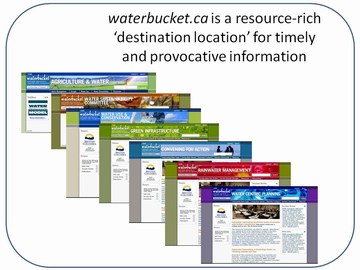
7. What is a Regional Team Approach?
Vancouver Island is the pilot region for a precedent-setting approach to regional team-building. “Through programs such as the Vancouver Island Learning Lunch Seminar Series, we are informing and educating those who influence or impact how land is developed and water is used,” reports Kim Stephens.
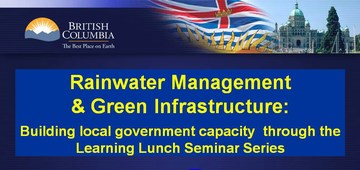
Partnerships and Collaboration
“A regional team approach is founded on broad and inclusive partnerships and collaboration that reach for the common goal of sustainability. In short, we have set our sights on the common good and challenge the old barriers of jurisdictional interests. To achieve the common good, this requires bringing together:
- Local government – those who plan and regulate land use;
- Developers – those who build;
- The Province – those who provide the legislative framework;
- Universities and colleges – those who provide research; and
- The stewardship sector – those who advocate conservation of resources.”
“To get to the big picture, it starts with the smallest pieces. Hence, the Convening for Action team is advancing a regional team approach that aligns local actions with provincial policy goals, in particular those defined in the Living Water Smart guidance document,” concludes Kim Stephens.
Story of the Vancouver Island Pilot
The Story of the 2008 Vancouver Island Learning Lunch Seminar Series is told in the words of those who embraced the concept and made it happen. The story describes how this pilot fits into a bigger picture; and how the program elements that comprise Convening for Action on Vancouver Island are linked. Each success builds on the last, and paves the way for the next.
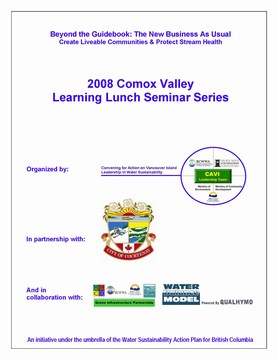
8. Vancouver Island Learning Lunch Seminar Series
The Learning Lunch Seminar Series refers to and uses a number of currently available guidance documents and/or tools, in particular Beyond the Guidebook: Context for Rainwater Management and Green Infrastructure in British Columbia.
Beyond the Guidebook builds on the science-based foundation provided by Stormwater Planning: A Guidebook for British Columbia, published in 2002, and incorporates lessons learned over the past six years in moving from planning to action.
Guidebook Legacy
 “After six years, one of the lessons learned is the need for a program that will ensure province-wide consistency in understanding of approaches and desired outcomes,” observes Peter Law (Ministry of Environment), Chair of the Stormwater Guidebook Steering Committee.
“After six years, one of the lessons learned is the need for a program that will ensure province-wide consistency in understanding of approaches and desired outcomes,” observes Peter Law (Ministry of Environment), Chair of the Stormwater Guidebook Steering Committee.
“Hence, a premise underpinning the Learning Lunch Seminar Series is that this consistency is best achieved by taking a continuing education program into the places where local government practitioners work.”

Seminar Genesis and Design
“When we came up with the Learning Lunch idea, our objectives and expectations were quite modest,” reports John Finnie, General Manager of Water & Wastewater Services, Regional District of Nanaimo (and Chair of CAVI – Convening for Action on Vancouver Island. “We wanted to explore a collaborative approach that we believed would help local governments make informed land development decisions that meet multiple objectives.”
“Initially we were thinking in terms of a small group setting…perhaps 12 to 15 people drawn from the various departments within a willing local government. We wanted to bring together engineers, planners, building inspectors and bylaw enforcement officers; and we wanted the focus to be on aligning efforts to implement effective green infrastructure.”
“The idea resonated, so much so that the original inter-departmental concept quickly mushroomed into an inter-governmental concept. The Cowichan Valley Regional District and City of Courtenay both volunteered to host a regional seminar series, in part because of the opportunity to play a leadership role provincially.”
“Each series comprised a set of three seminars. By spreading the curriculum over three sessions, this enables participants to take in new information, reflect on it, blend it with their own experience, test it, and eventually apply it in making decisions. In terms of the actual curriculum design, it was a matter of drawing upon a number of provincial guidance documents and making them interesting and relevant to a mixed audience.”
Overview of Series Outcomes
The Learning Lunch Seminar Series helped local government representatives conceptualize why a consistent approach to rainwater management and green infrastructure is needed and what it means regionally.
Cowichan Valley Series:
For Kate Miller, Manager Regional Environmental Policy Division at the Cowichan Valley Regional District, the series provided an opportunity to develop a policy framework for the valley. “It meant that we could foster an informed dialogue that  would ultimately lead to adoption of a set of tools for implementing green infrastructure region-wide.”
would ultimately lead to adoption of a set of tools for implementing green infrastructure region-wide.”
As an outcome of the series, Cowichan Valley local governments proceeded with the Cowichan Valley Water Balance Model Forum in October 2008. Three willing development proponents and their planning/design consultants were invited to develop case study applications of the Water Balance Model, a web-based tool for evaluating how to achieve runoff-based performance targets.
“The case studies were shared at the Forum in order to help build a common understanding. This educational approach is helping Cowichan Valley local governments identify and empower a core group of local champions who will then have the expertise to apply and advance the water balance approach to land development.”
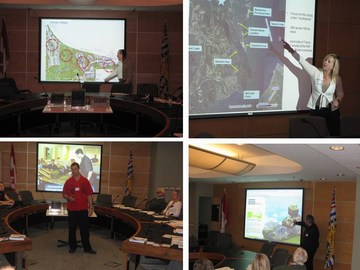
Comox Valley Series:
 “Our challenge is to work around and with boundaries,” says Derek Richmond, Manager of Engineering for the City of Courtenay. “Ideally, we would like to shift the paradigm from boundaries to areas of commonality.” For Derek Richmond, the series has provided the springboard for bottom-up regional action in the Comox Valley to communicate, cooperate, collaborate and coordinate.
“Our challenge is to work around and with boundaries,” says Derek Richmond, Manager of Engineering for the City of Courtenay. “Ideally, we would like to shift the paradigm from boundaries to areas of commonality.” For Derek Richmond, the series has provided the springboard for bottom-up regional action in the Comox Valley to communicate, cooperate, collaborate and coordinate.
An example is the Millard/Piercy Gaps Analysis Project, which has evolved from a simple regulatory gaps analysis to a regional pilot that will inform watershed-based land use planning across jurisdictions. “The current process has the Comox Valley Land Trust collaborating with regional and municipal planners, engineers and elected representatives to develop a new way of doing business in the Comox Valley.”

9. Convening for Action in Metro Vancouver
How do we simultaneously work together as staff within a municipality and as a region AND externally with developers and other private sector players, to ensure we implement sustainable approaches to development?

Water Balance Model Forum
The above challenge statement provided context for advancing a ‘regional team approach’ at the Metro Vancouver Water Balance Model Forum on March 12, 2009. Hosted by the City of Surrey, this learning event was co-sponsored by the Water Balance Model Inter-Governmental Partnership and the Green Infrastructure Partnership. .
The Forum was designed to start a dialogue between policy-makers and project implementers. To that end, the Forum program was built around the HOW question as it pertains to green infrastructure: HOW will the City of Surrey ensure it gets built right; HOW will a consistent regional approach be achieved in Metro Vancouver?
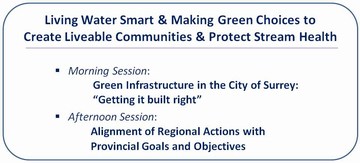
Alignment with Provincial Goals
“The Surrey Forum was designed to achieve multiple objectives in accordance with the policy framework developed by the Province in Living Water Smart, BC’s Water  Plan, states Ted van der Gulik, IGP Chair. “In particular, we explored ways that regulators and designers can apply the Water Balance Model to facilitate implementation of green infrastructure solutions that achieve two objectives: create liveable communities and protect stream health.”
Plan, states Ted van der Gulik, IGP Chair. “In particular, we explored ways that regulators and designers can apply the Water Balance Model to facilitate implementation of green infrastructure solutions that achieve two objectives: create liveable communities and protect stream health.”
“Our vision is that the Forum will be the catalyst for additional regional forums that would be organized in collaboration with Metro Vancouver’s Stormwater Interagency Liaison Group. One of our goals is to implement an educational program that would be modelled on the 2008 Vancouver Island Learning Lunch Seminar Series.”
Creating Our Future
 “We see the Forum as providing an opportunity to generate positive energy in the region. In particular, the Forum will inform the actions identified in the rainwater/stormwater component of Metro Vancouver’s updated Liquid Waste Management Plan,” states Ray Fung, Chair of the Green Infrastructure Partnership. “We believe this is where the opportunity for implementing a regional team approach resides.”
“We see the Forum as providing an opportunity to generate positive energy in the region. In particular, the Forum will inform the actions identified in the rainwater/stormwater component of Metro Vancouver’s updated Liquid Waste Management Plan,” states Ray Fung, Chair of the Green Infrastructure Partnership. “We believe this is where the opportunity for implementing a regional team approach resides.”
 “Once we know what we want our watersheds and neighbourhoods to look like, the next step is to decide what the tools are that will get us there,” concludes Vincent Lalonde, General Manager (Engineering) with the City of Surrey. “All of us ….whether we are regulators, developers or designers ….need to understand and care about the goal if we are to create the future that we all want.”
“Once we know what we want our watersheds and neighbourhoods to look like, the next step is to decide what the tools are that will get us there,” concludes Vincent Lalonde, General Manager (Engineering) with the City of Surrey. “All of us ….whether we are regulators, developers or designers ….need to understand and care about the goal if we are to create the future that we all want.”
10. Rewarding Good Behaviour
“Living Water Smart is a provincial strategy; we must look at it as a shared responsibility,” sums up Glen Brown, Executive Director, Local Government Infrastructure and Finance Division of the Ministry of Community Development.
“Actually, it is not one strategy; the Province has a number of strategies, including the Green Communities Project and the Climate Action Plan. The Province is looking at raising the bar as far as what we are trying to accomplish with standards, provincial legislation and infrastructure grant programs.”
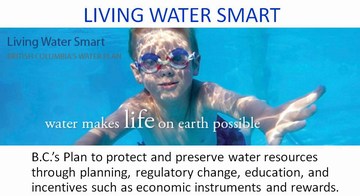
How We Develop Land
“We really have to look at how we develop land. Ultimately this requires leadership and champions on the ground. The message is that the Province is rewarding good behaviour.”
“Beyond the Guidebook is an on-the-ground application of Living Water Smart. It helps focus the attention of local governments and the development community on what is an achievable outcome that makes sense, and results in net environmental benefits at a watershed scale,” concludes Glen Brown.
